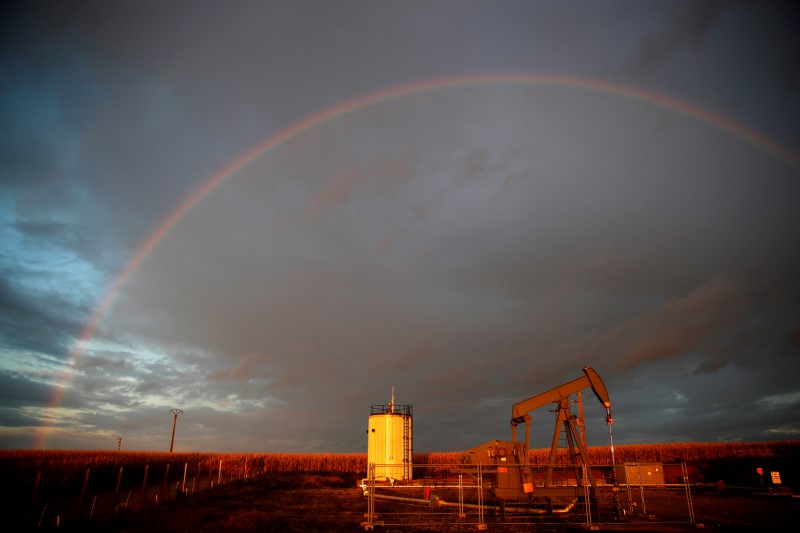* Brent could rise to $70/bbl by Q3 - banks
* U.S. crude, refined products stocks likely fell last
week-poll
* Coming up: API inventory data at 2130 GMT
By Jessica Jaganathan
SINGAPORE, Feb 23 (Reuters) - Oil prices rose again on
Tuesday after a jump in the previous session, holding near a
more than 13-month high as U.S. output was slow to return after
a deep freeze in Texas shut in crude production last week.
Shale oil producers in the southern United States could take
at least two weeks to restart the more than 2 million barrels
per day (bpd) of crude output that shut down because of cold
weather, as frozen pipes and power supply interruptions slow
their recovery, sources said. Brent crude LCOc1 futures were up 28 cents, or 0.4%, at
$65.52 a barrel by 0102 GMT, while U.S. crude oil CLc1 rose 14
cents, or 0.2%, to $61.84 a barrel. Both benchmarks rose nearly
4% in the previous session.
"The positive momentum continues in the oil complex, with
investors unabashedly predisposed to a bullish view," said
Stephen Innes, chief global markets strategist at Axi in a note.
"Several significant oil price revisions were announced
overnight and may have contributed to the rally of over 3%," he
said.
Goldman Sachs Commodities Research raised its Brent crude
oil price forecasts by $10 for the second and third quarters of
2021, citing lower expected inventories, higher marginal costs
to restart upstream activity and speculative inflows.
The Wall Street bank expects Brent prices to reach $70 per
barrel in the second quarter from the $60 it predicted
previously and $75 in the third quarter from $65 earlier.
Morgan Stanley expects Brent crude prices to climb to $70
per barrel in the third quarter on "signs of a much improved
market" including prospects of improving demand. Also supporting prices, OPEC and U.S. oil companies see a
limited rebound in shale oil supply this year as top U.S.
producers freeze output despite rising prices, a decision that
would help OPEC and its allies. Stockpiles of U.S. crude oil and refined products likely
declined last week, a preliminary Reuters poll showed on Monday,
due to the disruption in Texas.
- English (USA)
- English (UK)
- English (India)
- English (Canada)
- English (Australia)
- English (South Africa)
- English (Nigeria)
- Deutsch
- Español (España)
- Español (México)
- Français
- Italiano
- Nederlands
- Português (Portugal)
- Polski
- Português (Brasil)
- Русский
- Türkçe
- العربية
- Ελληνικά
- Svenska
- Suomi
- עברית
- 日本語
- 한국어
- 简体中文
- 繁體中文
- Bahasa Indonesia
- Bahasa Melayu
- ไทย
- Tiếng Việt
- हिंदी
Oil prices rise further on slow U.S. output restart
Published 02/23/2021, 09:24 AM
Updated 02/23/2021, 09:30 AM
Oil prices rise further on slow U.S. output restart

Latest comments
Install Our App
Risk Disclosure: Trading in financial instruments and/or cryptocurrencies involves high risks including the risk of losing some, or all, of your investment amount, and may not be suitable for all investors. Prices of cryptocurrencies are extremely volatile and may be affected by external factors such as financial, regulatory or political events. Trading on margin increases the financial risks.
Before deciding to trade in financial instrument or cryptocurrencies you should be fully informed of the risks and costs associated with trading the financial markets, carefully consider your investment objectives, level of experience, and risk appetite, and seek professional advice where needed.
Fusion Media would like to remind you that the data contained in this website is not necessarily real-time nor accurate. The data and prices on the website are not necessarily provided by any market or exchange, but may be provided by market makers, and so prices may not be accurate and may differ from the actual price at any given market, meaning prices are indicative and not appropriate for trading purposes. Fusion Media and any provider of the data contained in this website will not accept liability for any loss or damage as a result of your trading, or your reliance on the information contained within this website.
It is prohibited to use, store, reproduce, display, modify, transmit or distribute the data contained in this website without the explicit prior written permission of Fusion Media and/or the data provider. All intellectual property rights are reserved by the providers and/or the exchange providing the data contained in this website.
Fusion Media may be compensated by the advertisers that appear on the website, based on your interaction with the advertisements or advertisers.
Before deciding to trade in financial instrument or cryptocurrencies you should be fully informed of the risks and costs associated with trading the financial markets, carefully consider your investment objectives, level of experience, and risk appetite, and seek professional advice where needed.
Fusion Media would like to remind you that the data contained in this website is not necessarily real-time nor accurate. The data and prices on the website are not necessarily provided by any market or exchange, but may be provided by market makers, and so prices may not be accurate and may differ from the actual price at any given market, meaning prices are indicative and not appropriate for trading purposes. Fusion Media and any provider of the data contained in this website will not accept liability for any loss or damage as a result of your trading, or your reliance on the information contained within this website.
It is prohibited to use, store, reproduce, display, modify, transmit or distribute the data contained in this website without the explicit prior written permission of Fusion Media and/or the data provider. All intellectual property rights are reserved by the providers and/or the exchange providing the data contained in this website.
Fusion Media may be compensated by the advertisers that appear on the website, based on your interaction with the advertisements or advertisers.
© 2007-2025 - Fusion Media Limited. All Rights Reserved.